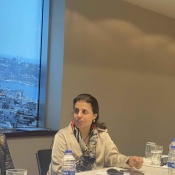Workshop explores realities, prospects of youth life under Israeli Occupation
The Institute of Community and Public Health at Birzeit University (ICPH), in partnership with Oxfam-Quebec, held a workshop on March 6, 2018, to present the results of a study on the condition of youth in the occupied Palestinian territory.
The workshop took place at Birzeit University in the West Bank and in the Media Development Center’s Gaza headquarters in cooperation with the Media Development Center and the Center for Development Studies in Gaza.
The workshop was attended by a number of young men and women, local and international youth organizations, community-based organizations, political party leaders, staff from ministries and municipalities, Palestinian academics, lawyers and human rights activists, and university students. The number of attendees was approximately 140 in Birzeit and 70 in Gaza.
The results of the study were presented by the ICPH’s research team (Shiraz Nasr, Dima Masoud, Suzan Mitwalli, Ahmed Khatib, and Dr. Weeam Hammoudeh – study coordinator) and Haneen El Sammak, a researcher from Gaza.
The study focused on two areas: the well-being of Palestinian youth and their attitudes towards gender equity/equality. The results of the study indicate that the well-being of Palestinian youth is relatively low and that the marginalization of young people in various areas (social, political and economic) has negative effects on their well-being.
The most important determinants of well-being, the study found, are the social factors, including family support and confidence in the family, and society and personal freedoms. Political factors also have a negative impact on well-being. These factors include the negative effects of the Israeli Occupation, internal marginalization and suppression of youth, corruption and mistrust in public institutions, and widespread unemployment, all of which have led to a negative impact on well-being.
The second part of the study highlighted a noticeable disparity between male and female views on gender equity/equality. The qualitative part of the study revealed that social pressure leads to stress for both young men and women; however, greater restrictions are imposed on women, as opposed to men. The results of the study also indicate the need to raise awareness among young men and women and to address gender issues in cooperation with the broader society.
In the second part of the workshop, participants were divided into mini-discussion groups to draft recommendations related to the topics of the research.
Vice President for Community Affairs at Birzeit University Dr. Asem Khalil emphasized the university's commitment to community development, scientific research, and increasing knowledge and awareness. Dr. Khalil noted that the study's outputs will contribute to drafting recommendations that meet its objective: improving the reality of Palestinian youth.







